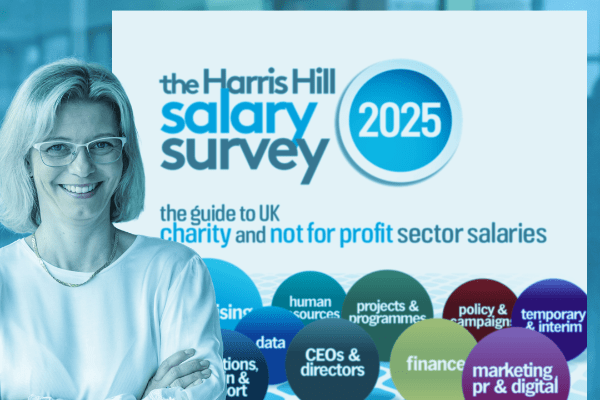Stress. Burnout. Anxiety. Pervasive but unwelcome players in the modern working game; and seriously damaging to our health and career.
To coincide with Stress Awareness Month, Nicola Greenbrook looks at what stress is, how it manifests at work and how you can move from distress to de-stress (but still get the work done).

How are you feeling about work right now?
Are you under pressure to deliver, but thoroughly enjoying the adrenaline rush? Or is the creaking weight of your to-do list about to collapse, taking you down with it?
Stress in the current climate
The world is angry and stressed. According to the Gallup Global Emotions Report, a third of 150,000 people interviewed in over 140 countries said they suffered stress. At least one in five experienced sadness or anger.
Things aren’t much better closer to home. In the latest Health and Wellbeing at Work report from the CIPDand Simplyhealth, 37% of businesses had seen stress-related absence increase last year. Heavy workloads (62%), management style (43%) and relationships at work (30%) were the main culprits. Refinery 29 reports that 3 in 10 millennials experience 'work-disrupting anxiety' - twice as much as the national average.
Anyone else feeling a bit edgy just reading all that?
Stressy desk
Stress is not a new phenomenon. Our cave-dwelling ancestors used the physical response to stress to prevent danger, such as a run-in with a sabre-toothed tiger.
Thankfully we’re no longer fighting off angry felids on the commute, but we are regularly dealing with adverse, demanding circumstances. In the UK, we’re putting in the longest hours in the EU. Technology smashes our work-life boundaries and enables us to work at 2pm or 2am. Via the ping of a smartphone notification we deliver bad news (whether fake, or real) to our desk and become distracted and anxious.
Some pressure can be healthy: it sends our bodies into ‘fight or flight’ mode, releasing a cocktail of hormones and chemicals to keep us focused and responsive. It’s when excessive pressure morphs into stress that the bad stuff happens.
Brain function minimises leading to a ‘I can’t think straight’ situation. Being in ‘fight’ mode for too long makes us crabby, or worse aggressive, towards our colleagues. Staying in ‘flight’ mode means we avoid tackling a tricky task or situation which then intensifies.
Worse still, stress can cause ‘freeze’ mode: effectively, we do nothing and become paralysed by it.
Why should we pay attention?
Stress is one of the great public health challenges of our time. It’s a significant factor in depression and anxiety and has been linked to physical health problems such as heart disease and immune and digestive functioning.
In the workplace, stress can cause cognitive issues such as poor judgement and indecision, and emotional issues like irritability and panic, not to mention physical and behavioural ones. Stephanie Denning writing for Forbes, describes stress as the business world’s silent killer and notes the two primary, unnoticed, costs are the financial and productivity ones.

How to move from distress to de-stress at work
The Stress Management Societyuse a great bridge analogy; when someone is faced with excessive demands that exceed their personal and social resources it’s like a bridge carrying too much weight. It bows, buckles and creaks - and eventually will collapse.
If you’re feeling the strain at work right now, and want to avoid a buckling bridge, here ’s some takeaway tips…
► Work smarter, not longer
Writing for Riposte Magazine, Pip Jamieson, Founder & CEO of The Dots, notes that although excessive working hours are often a modern badge of honour, it can be counterintuitive - and doesn’t always equal better output. Over-stretching can cause fatigue, emotive decision making and even sickness. So think carefully about staying late again tonight and be realistic about what your frazzled brain will achieve. Throw in the towel and start again, fresh, tomorrow (and make that yoga class/drink instead).
► Rest
It’s often ‘rest’ breaks that take the hit when we’re stressed at work. In their book, Burnout: The Secret to Solving the Stress, sisters Emily Nagoski and Amelia Nagoski cite the need for our body and brains to rest (42% of your time, about 10 hours out of every 24) to avoid burnout. Steer clear of filling every minute at work with activity and take a manageable lunch break. Pay attention to your thirst, and when the kettle is boiling, resist the temptation to check emails on your phone. Forgive me, but do you often hold in a wee at your desk just to finish one.more.thing before dashing off to the loo and hoping you won’t get intercepted along the way. Yes? Don’t.
► Switch off
Absence might be at an all-time low according to the CIPD, but the reality is that 83% of us are struggling into work when we’re actually poorly, and 63% of us are using our holidays to work. Learn to prioritise your health, guilt-free. If you’re genuinely ill and unable to function at 100%, dragging yourself to the office could expose your team to germs, result in sub-standard work or increased mistakes and run the risk of taking longer than normal to recover.
►Just say no
if you’re rushing from one task to the next, taking on too much or trying to please everyone at work it could be time to work on your assertiveness. Saying no doesn’t mean you’re unhelpful or selfish, it enables you to honour your existing commitments and do them properly. It could allow more inexperienced team members to step up and aid their development, and it’s also healthier in the long run as it prevents you from taking on too much (and a buckling bridge).

For managers
Dealing with stress in your team can be very difficult, especially if you’re a manager under strain yourself. Here are some areas to consider:
► Stress can manifest differently between individuals. Get to know your team and try to spot the signs as early as possible; such as someone becoming unusually withdrawn or short-tempered, having increased absence or not taking holidays.
►Regularly review workloads, job design and responsibilities and encourage openness and communication. Foster a sense of collaboration; helping each other out so the workload is evenly spread to avoid one person going under.
►Don’t feel you have to deal with it personally. Signpost individuals to the experts (such as via an Employee Assistance Programme, GP or councillor) and ask for training in stress management.
►Lead by example and promote good working habits; take breaks, and try to leave on time as often as possible.
--------------------------------
Stress at work can have a damaging and long-lasting impact on our physical and mental health. A stressed workplace can lead to low productivity, poor delivery to clients and service users and high turnover.
Adopting some simple methods to minimise stress at work and return to a state of productivity - and good mental health - is not selfish. It’s critical.
Get the work done, without undoing yourself in the process.
Nicola Greenbrook - HR Specialist & Freelance Writer

More from Nicola Greenbrook:
► I quit! How to leave a job gracefully
► How to be productive at work
► Charity Careers: meet Andy Harris, director of income generation for Shelter UK
► Back to the blog homepage
-

Opportunity for all
Find out how we’re working to deliver more diverse, equitable and inclusive recruitment…
-

Recruiting a charity CEO?
Our executive recruitment specialists have an exceptional record of successful CEO, chair, trustee and…
-

Charity sector salaries
Our 2025 Salary Survey has the latest rates and expert insight for roles throughout the sector.













